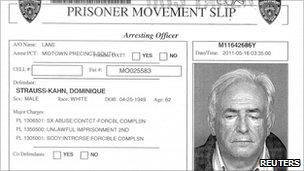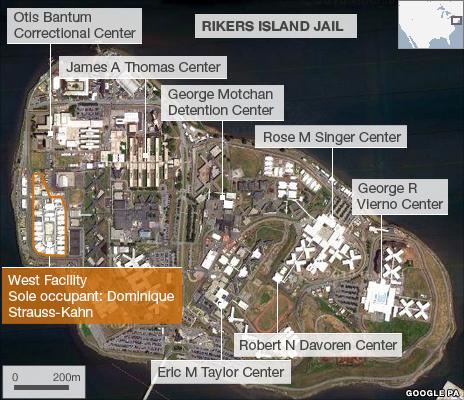IMF chief Dominique Strauss-Kahn quits over sex charge
- Published
- comments

Dominique Strauss-Kahn was denied bail at a hearing on Monday
International Monetary Fund chief Dominique Strauss-Kahn has resigned following allegations he sexually assaulted a hotel maid in New York.
In a statement, Mr Strauss-Kahn - who is being held in Rikers Island prison - said he wanted to "devote all my strength... to proving my innocence."
Mr Strauss-Kahn will make a fresh application for bail later on Thursday.
Whether his successor comes from the developed or developing world will be a topic of hot debate, analysts say.
In the statement, Mr Strauss-Kahn said, external it was with "infinite sadness" that he tendered his resignation.
"I think at this time first of my wife - whom I love more than anything - of my children, of my family, of my friends. I think also of my colleagues at the Fund."
He said he denied "with the greatest possible firmness" all of the allegations against him, but said he wanted to protect the IMF.
The IMF said it would release information "in the near future" about appointing a successor.
The organisation's deputy, John Lipsky, has been in interim control of the IMF since Mr Strauss-Kahn's arrest on Saturday.
Dominique Moisi, a special adviser at the French Institute for International Relations, said it was sad that "a brilliant career" had ended in "such an indignant way".
But he added that some in France were coming to believe that "there is maybe a Dr Jekyll and Mr Hyde in the personality of Mr Strauss-Kahn".
The pressure had been growing on Mr Strauss-Kahn both at home and abroad, says the BBC's Christian Fraser in Paris.
US Treasury Secretary Timothy Geithner had led calls for him to stand down, followed by the head of the governing right-wing UMP party in France, Jean-Francois Cope, who said he couldn't see how Mr Strauss-Kahn could carry on.
Analysts say Mr Strauss-Kahn's resignation heralds a battle between established and emerging economies over who will get the top job.
Traditionally, the US names the head of the World Bank, while the top job at the IMF goes to a European.
A Chinese government spokeswoman said the selection process should be based on "merit, transparency and fairness" - adding "we believe that emerging and developing countries should have representation at senior levels", Reuters reported.
However, Germany has said it wants the next head of the IMF to come from Europe.
Bail hearing
Mr Strauss-Kahn faces a number of charges in connection with the alleged sexual assault of a 32-year-old maid in New York's Sofitel hotel on 14 May.
They are: committing a criminal sexual act, attempted rape, sexual abuse, unlawful imprisonment and forcible touching.
Police have removed a piece of carpet from the Sofitel hotel, in search of evidence to support the maid's allegation she was forced into an act of oral sex.
Mr Strauss-Kahn's lawyer, Benjamin Brafman, said on Monday that the defence believes the forensic evidence "will not be consistent with a forcible encounter".
On Monday a judge in New York denied Mr Strauss-Kahn bail - despite the offer of a $1m (£618,000) guarantee - saying there was a risk the IMF chief would flee the country.
However, he will make a new plea for bail at a court hearing on Thursday morning, Mr Brafman says.
A copy of his bail application, published on the website of the New York Times,, external shows Mr Strauss-Kahn's lawyers are offering new conditions for bail in an effort to convince the judge that he will not try to flee while he prepares his defence.
Lawyer Jeffrey Shapiro: "She had no idea who this man was when she went into the room"
They include Mr Strauss-Kahn being confined 24 hours a day to a Manhattan address, subject to electronic surveillance.
The application also highlights Mr Strauss-Kahn's wife's ties to the US in an attempt to counter suggestions he could be a flight risk, saying she was partly schooled there and is currently working on a book about American political life, and pointing out the pair own a $4m home in Washington DC.
Since being remanded in custody, Mr Strauss-Kahn been placed on suicide watch at Rikers Island, a notorious prison.
Jeffrey Shapiro, lawyer for Mr Strauss-Kahn's accuser, says his client feared for herself and her daughter when she discovered Mr Strauss-Kahn's identity after the incident.
He said she had only become aware of Mr Strauss-Kahn's identity "a day later when a friend called her to tell her, 'do you have any idea who this man is who did this to you?'".
Mr Shapiro said his client was "scared and incredulous".
"When she found out this encounter was with a man of great power and wealth she feared not only for herself but more importantly for her daughter."
The woman, from the West African nation of Guinea, had now been reunited with her 15-year-old daughter in a "safe place", he added.
